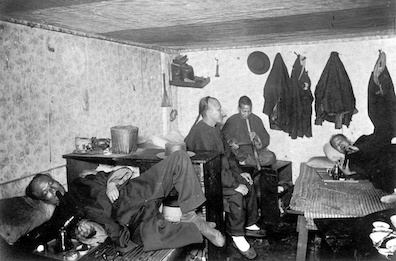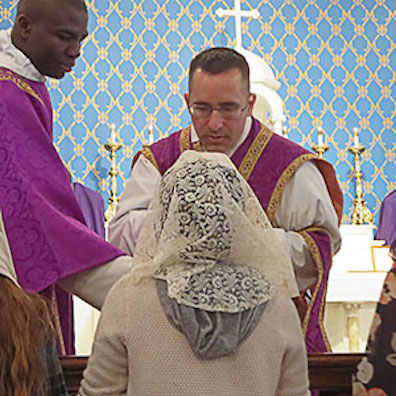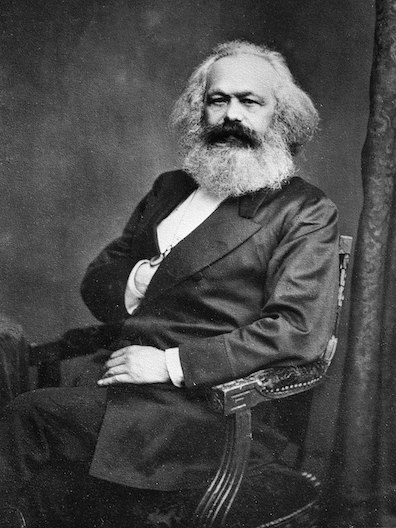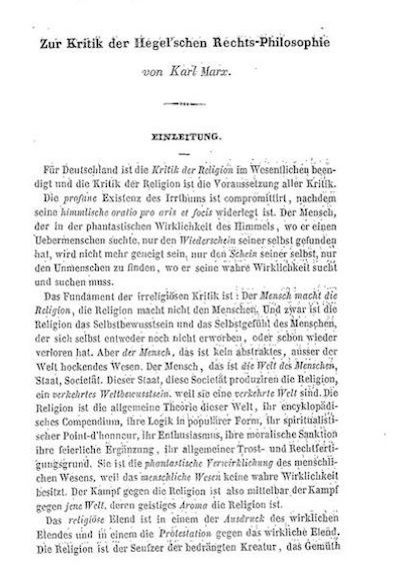The stereotype of Chinese opium addicts was no fantasy: opium
use was widespread in China and also in Chinese communities
abroad. It was an affliction created and sustained by the
trade policies of the British government and the British East
India Company, who exported opium from their Indian
possessions to China in exchange for tea and other Chinese
goods. The trade was not optional: Britain fought and won two
so-called Opium Wars in 1839-42 and 1856-60 to force China to
keep ports like Canton (Guangzhou), Hong Kong, and Shanghai
open to its merchant ships. As a consequence of this enforced
trade, millions of Chinese became addicted to opium. (So did
many British and French when opium dens sprang up in the home
countries of the colonial powers responsible for keeping China
in subjection.) Bloom imagines that missionaries trying to
sell the Chinese on Christianity may find that their spiritual
needs are already met: "Prefer an ounce of opium."
The fact that he thinks of opium as competition for Christianity
speaks volumes about his view of the religion. As soon as he
enters the church he observes women kneeling "
in the benches
with crimson halters round their necks. A batch
knelt at the altarrails." The words "halters" and
"batch" suggest that these women waiting to receive Communion
are bovine or sheeplike—an impersonal mass of blind believers.
Bloom's critique becomes more overt when the priest who is
slipping wafers into the women's open mouths intones a sacred
formula: "
Good idea the Latin. Stupefies them first." The
people that he sees shuffling back to their pews express no
human emotions: "
He stood aside watching their blind masks
pass down the aisle." And yet, Bloom thinks, something
very pleasurable must be going on inside them: "
Look at them.
Now I bet it makes them feel happy. Lollipop. It does." A
sleepy analgesic haze suffuses the entire church, as in an opium
den: "
Old fellow asleep near that confessionbox. Hence those
snores. Blind faith. Safe in the arms of kingdom come. Lulls
all pain. Wake this time next year."
Karl Marx called religion "the opium of the people" in the
introduction to an unpublished 1843 manuscript titled
Critique of Hegel's Philosophy of Right. He used the
word Volk rather than the demeaning language usually
attributed to him ("masses"), and his comments were more
sympathetic to religion than is commonly supposed:
Man is the world of man—state, society. This
state and this society produce religion, which is an inverted
consciousness of the world, because they are an inverted
world.... Religious suffering is, at one and the same time,
the expression of real suffering and a protest against real
suffering. Religion is the sigh of the oppressed creature, the
heart of a heartless world, and the soul of soulless
conditions. It is the opium of the people…. The
abolition of religion as the illusory happiness of the people
is the demand for their real happiness.
(trans. Joseph O'Malley)
Marx cannot have meant the drug comparison to sound simply
hostile and insulting: opium use was perfectly legal in 1843,
and not just common people leading tedious lives but many
leading European artists and intellectuals found solace in it.
He envisions a world in which people will not need either
mood-altering substances or otherworldly consolations to
distract them from the manifest insufficiency of their
existence. Such pleasures are "illusory," but in the world as
presently constituted they are also necessary.
Bloom's ambivalent responses to the worshipers in the church
invite sustained comparison with these views.
Seen objectively, the people in
St. Andrew's may resemble the dazed and dehumanized inhabitants
of an opium den, but Bloom makes an effort to sympathetically
imagine the consolations that their faith provides: "Now I bet
it makes them feel happy. Lollipop. It does.
Yes, bread of
angels it's called. There's a big idea behind it, kind of
kingdom of God is within you feel....
feel all like
one family party, same in the theatre, all in the same swim.
They do. I'm sure of that. Not so lonely. In our confraternity….
Thing is if you really believe in it."
Two annotators of
Ulysses, Kiberd and Slote, cite Marx
as a possible analogue or source for Bloom's "ounce of opium,"
but Thornton, Gifford, and Johnson do not. Both decisions are
defensible. It seems likely that most readers of the novel have
thought of Marx when they see opium mentioned in connection with
religion, but Joyce does not explicitly assert any resemblance
or equivalence. There is also the question of how he could have
known the expression. Marx published his introduction to the
Critique
in 1844, and in the same year he used it also in a piece for an
obscure radical magazine, but these publications were not widely
read. Not until the heyday of international Communism in the
1930s did "the opiate of the masses" become a popular meme.
Skeptics may ask whether Joyce could possibly have read or heard
of it.
Long odds notwithstanding, it is seldom a good idea to bet
against Joyce's nose for obscure, telling details, and this
detail feels almost too perfect to discount. In a chapter
modeled on the Homeric story
of a psychotropic plant that makes life feel bearable
but distracts people from reality, Bloom compares a
psychotropic plant that does the same thing with a religion
that is competing with it. And Marx is mentioned later in Ulysses.
In Cyclops, Bloom shouts out his name as someone whose
work he is proud of: "Mendelssohn was a jew and Karl Marx
and Mercadante and Spinoza. And the Saviour was a jew and
his father was a jew. Your God." Alas for
less-than-totally-obsessive readers of this novel, it is all
too characteristic of Joyce to signal in one chapter the
importance of an author whose ideas are explored in a
different chapter.




